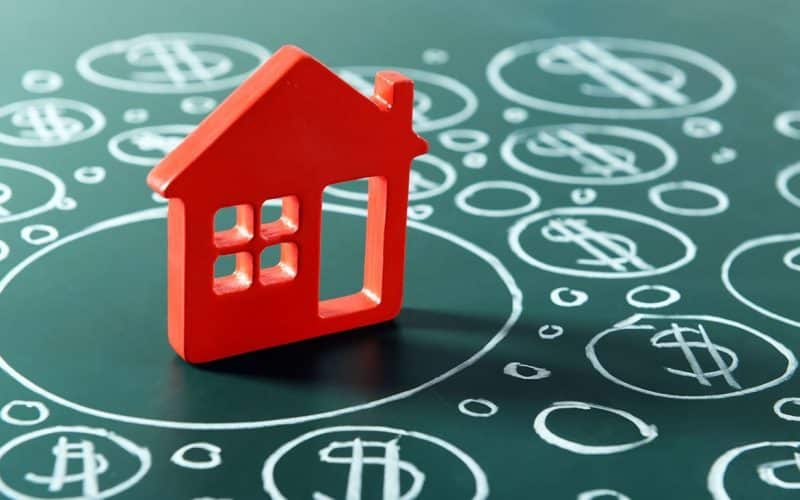Buying a house with bad credit — or, more precisely, a low credit score — might be difficult, but not impossible.
A down payment, a strong history of paying your bills over the last year or two, and a consistent salary are all required when purchasing a home. In addition, you must meet the lender’s minimal credit score standards. While higher credit ratings result in better loan terms, it is still feasible to buy a house with bad credit.
Can You Buy a House With Bad Credit?
If you’re wondering how to buy a house with bad credit, know that it won’t be easy, but it is possible for you. You’ll only need to devote a bit extra time to planning and preparation before you begin truly looking for a house.
Having said that, it is a highly personal process. Buying a home with bad credit may not be an option for everyone. It is determined by a number of factors, including:
- How bad is your credit?
- Your source of income, how large it is, and how consistent it is
- What additional obligations do you have?
- Whether local lenders are willing to deal with you.
How To buy A house With Bad Credit
Let’s look at some of the available loan alternatives and the average credit score requirements for each of them.
#1. Traditional Loans
There is no defined income, credit score, or down payment requirement to qualify for a conventional loan. However, a 620 or higher credit score is normally required to qualify for a traditional mortgage loan.
There are, however, exceptions. If you have a high income relative to your loan amount or a bigger than a minimal down payment, you may be able to qualify for a conventional loan even if your credit score is below 620.
#2. FHA Mortgages
An FHA loan is one that is guaranteed by the Federal Housing Administration. Because of the lower qualifying requirements, FHA loans can be particularly appealing to first-time home buyers.
The FHA loan requires a minimum credit score of 500.
There are also extra qualification requirements for FHA loans. For example, you can only use an FHA loan to buy a primary house.
#3. Veterans Administration Loans
You may be eligible for a VA loan if you are a veteran or are actively serving in the military forces.
A VA loan is backed by the Department of Veterans Affairs and allows you to buy a home with no money down. Some lenders could need you to pay a one-time “funding charge.”
To qualify for an FHA loan, your home must meet certain criteria. While the VA does not require a specific credit score, most lenders do. Rocket Mortgage®, for example, requires a minimum credit score of 580.
#4. USDA Loans
A USDA loan* is another loan backed by the United States Department of Agriculture. A USDA loan allows you to buy a home in an eligible rural location with no money down.
To qualify for the loan, most lenders will require a 640 credit score, as well as other income restrictions related to a USDA loan.
What Constitutes a Bad Credit Score in the Eyes of Mortgage Lenders?
Most consumers are unaware that many lenders do not require a specified minimum credit score to buy a house. The catch-22 is that a conventional mortgage lender is free to impose their own credit score standards. Although government-backed loans provide some comfort to mortgage lenders, they nevertheless have credit score restrictions, even if they are typically significantly lower.
If your credit score is less than 500, you may have difficulty securing a mortgage and will need to work on improving your score first.
How to Raise Your Credit Score Before Buying a House
Yes, it is possible to buy a house with bad credit – but it is also possible to buy with good credit!
Remember that credit ratings are only temporary, and you can improve them by changing your behavior. Even minor modifications can make a big difference.
So, whether you have six weeks, six months, or more to buy a house, you can repair your credit over time.
Here are five straightforward methods for improving your credit and saving money on your mortgage, as well as two shortcuts.
#1. Examine your credit report for any mistakes.
You’ve never seen your mortgage credit report if you’ve never applied for one, and more than one-third of credit reports contain inaccuracies.
AnnualCreditReport.com allows you to examine your report before applying, or you can acquire your mortgage credit report as part of an online mortgage pre-approval.
Errors are common among renters who have moved frequently, those who pay or defer student loans, and men and women who have changed their legal names.
Credit reporting inaccuracies can lower your score by more than 100 points.
#2. Always pay your payments on schedule.
Making on-time payments to your creditors is another excellent approach to boosting your credit score. You’ll notice a difference in as little as 30 days.
If money is tight and you can’t afford to pay all of your expenses in full each month, make at least the minimum payments. Minimum payments are still made on schedule. Missed payments, on the other hand, are derogatories.
#3. Create a credit cushion for yourself.
The second-largest factor in your credit score is how much credit you have in your name, and having a lot of it is a good thing! It is a great concept.
Lenders want you to have a lot of credit because they realize how unpredictable life can be. When things go wrong, those high credit lines might keep you afloat so you can keep paying on your mortgage.
Take advantage of this. A customer support number can be found on the back of any credit card you own. Call it and ask for a credit limit increase.
You could gain 50 points or more.
#4. Maintain your credit accounts (for now)
Adding to your credit limits can help boost your total score, but removing credit away from your accounts can lower your score.
Refrain from canceling the old credit cards you never seem to use, as well as the personal charge card for the store you never visit. Those open accounts count toward your score and every point matters.
#5. Avoid getting new credit cards and incurring additional debt.
It is sometimes unavoidable. However, make every effort to work with the credit you already have. Do not apply for a new credit card, a new auto loan, or a new personal credit line. Each of these behaviors will result in a lower total score.
Shortcut 1: Become a registered user.
Credit bureaus allow two or more people to share credit, so request that a family member enroll you as an authorized user on their credit accounts. You will benefit from additional on-time payments as they pay their bills each month.
Note: If a family member fails to make a payment, it will count as a missed payment for you as well.
#2. Create a controlled credit account as a second shortcut.
Subscription-based credit companies developed following the Great Repression of 2009 to help individuals build solid credit. Self.inc, one of these companies, has assisted over 3 million people. It is not a free service, but home purchasers have reported success with it. Consider creating a Self Credit Builder Account.
Options for Home Loans For buyers With Bad credit
Here are some of the loan programs you can check into if your credit is ‘fair’ or ‘bad.’
#1. FHA loan (minimum credit score of 500-580)
Borrowers with credit ratings as low as 500 are eligible for this government-backed loan. If your credit score is that low, you will be asked to pay down at least 10%. A minimum of 580 is significantly more usual. As Ivan mentioned, different lenders may have different credit overlays, so you should double-check with your specific lender to determine if you qualify.
#2. VA loan (minimum credit score of 580-620)
VA loans are backed by the Department of Veterans Affairs and are only available to borrowers who have served in the military. The VA has no stated minimum credit score for those who qualify. However, VA lenders often want a FICO score of 580-620.
#3. USDA loan (minimum credit score of 640)
This loan is only accessible in qualifying rural areas. USDA loans often require only a 640 FICO score. However, exact conditions must be confirmed with your lender. Ivan stated that, in the aftermath of the pandemic, many lenders have imposed more severe lending overlays.
#4. Conventional loan (minimum credit score 620)
A conventional mortgage requires a minimum credit score of 620 as well as a 3-5 percent down payment.
Understanding and Enhancing Your Credit
As a prospective homebuyer, you should pay down debt, save as much money as possible, and evaluate your credit history. Knowing your creditworthiness is a critical step in purchasing a home with bad credit. Examine your credit report and credit score to find out. The report includes personal finance websites such as NerdWallet, your financial institution, and the government-mandated website annualcreditreport.com.
#1. Check your reports for mistakes.
Look for incorrectly updated accounts or anything else that does not adequately reflect your genuine credit history. If you discover any errors or inaccuracies, you can file a dispute with the credit bureaus or the creditor that provided the information.
#2. Repair your credit history.
Making timely payments may improve your credit score. A higher credit score can also increase your chances of obtaining a more affordable home loan.
Your credit scores will not be included in your free credit reports. To see mortgage scores, go to myFICO.com and purchase a full report. The most cost-effective method is to sign up, download the first month’s data, and then cancel the service before the next subscription period.
Which Loan Is Simplest for Bad Credit?
Payday, vehicle title, pawnshop, and personal installment loans are the easiest to get. These are short-term negative credit loans.
Will Banks Lend to Bad Credit Borrowers?
Banks, credit unions, and online lenders lend to people with bad credit, but their criteria for “creditworthiness” vary. It’s vital to compare lenders because some have stricter restrictions.
What Credit Is Needed to Buy a House?
Conventional loan applicants should have a credit score of 620 or higher. If your score is below 620, lenders may deny your loan or charge a higher interest rate, raising your monthly payment.
Which Loan Approval Is Easiest?
Which loans are easier to get? Payday, automobile title, pawnshop, and no-credit-check personal loans are the easiest to get. Bad credit borrowers can get these fast loans with little restrictions.
What Boosts Credit?
On-time payments, low credit card balances, a mix of credit card and loan accounts, older credit accounts, and few credit inquiries boost credit scores.
Conclusion
Even if you have bad credit, you can still enjoy the perks of homeownership. Instead, it may simply necessitate more research while looking for finance.
You can qualify for a mortgage with a government-backed loan, such as an FHA loan, even if your credit score is 500. It may be tempting to buy a home as quickly as possible, but it is advisable to take your time evaluating available options and interest rates before beginning your loan search.
Frequently Asked Questions
What is the lowest possible credit score to buy a house?
When applying for a traditional loan, you should have a credit score of 620 or above. If your credit score falls below 620, lenders may be unable to approve your loan or may be compelled to offer you a higher interest rate, resulting in higher monthly payments.
Can I get a mortgage with bad credit but good income?
While it may be more challenging, getting a mortgage with a low credit score is still doable, especially if you have a good salary. Speak with a specialist bad credit mortgage lender, explore a guarantor or joint mortgage, or simply work on your credit score.
How many points does a mortgage raise your credit score?
According to FICO®, even having your lender pull your credit can cause your credit score to drop by five points.
Does paying rent build credit?
Rent payments will not help you develop credit. However, reporting your rent payments can help you improve credit, particularly if you are new to credit or have little experience with it. If you rent again, having rental payment information on your credit report can be advantageous.
- Mortgage: Simple 2022 Guide for Beginners and all you need Updated!!!
- What Credit Score Do You Need to Buy a House: Best US Practices in 2022
- BUSINESS LOANS FOR VETERANS: Best Easy 2022 Guide and; US Practices
- 6 Tips For Buying An Affordable Home
- Manual Underwriting Process for Mortgages, FHA & VA Loans






